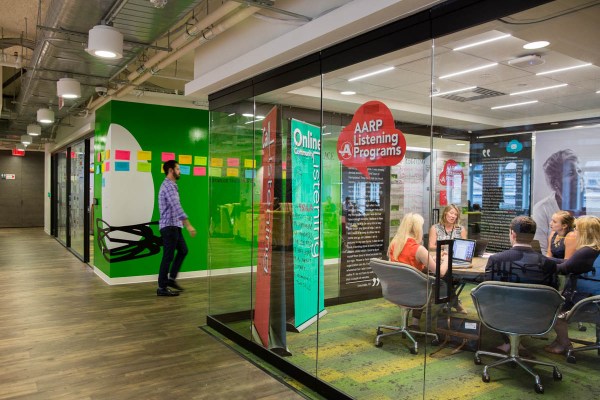A team of impetuous 20-something-year-old startup founders may not automatically reach out to the AARP to bring its products to market. Ignoring the aging population isn’t the sharpest move, however. With its Innovation Champion Award, AARP wants to highlight that those over 50 have sacks of disposable cash and aren’t afraid to spend it — as long as the value is there.
“Historically, people would retire at 65 and then have another 10 years to live or so,” says Anne Marie Kilgallon, vice president of Enterprise Strategy and Innovation for the AARP. “But things have changed a lot since then. These days, people live into their 90s, and these ‘bonus years’ are important.”
Ageism is a real thing, and it swings both ways. Remember, oh, about 100 words ago, when I flippantly referred to startup founders as 20-year-olds? You probably didn’t even notice, because that sort of thing happens all the time. “Young people are selfish and impulsive” and “old people hate technology” are truisms that hold true less and less often. This is one fight AARP is picking with its Disrupt Aging campaign — and a part of that is its new Innovation Champion Award.
“AARP is really committed to this caregiving space, and we want to be one of the voices that drives innovation to this space,” Kilgallon tells me. “That’s what we do as a social advocacy organization. But the realistic truth of the matter is that we can only relieve the burdens placed on caregivers by embracing technology.”
For most businesses, $10,000 is a nice chunk of change, but for the most successful of businesses isn’t going to move the needle. AARP knows that, but for them, it’s more of a $10,000 spotlight pointing at an enormous opportunity than the cash incentive in and of itself.
“Research shows that 70 percent of U.S. disposable income is controlled by an aging population,” Kilgallon explains, “so there are tremendous business opportunities here. We just want to help companies find those opportunities and help solve some of our key challenges in the process.”
The key challenges are reflected in the company’s awards categories, which are daily essential activities, caregiver quality of life, health and safety awareness, care coordination, social well-being and transition support. The companies up for awards will be judged on a number of criteria, not least of which is whether the businesses are viable.
“We love technology,” Kilgallon says, but stresses that her organization isn’t pushing tech for tech’s sake. “Winning technology needs to be affordable. It needs to have a business model that makes it viable. And it needs to be extremely well-designed. Gone are the days where the older generation eschewed all technology, but that doesn’t mean the tools and services shouldn’t be well-designed and easy to use.”
If the $10,000 doesn’t get your business senses a-tingling, the grand prize probably should: It includes traveling to Washington, DC to speak with top AARP executives about your business. A golden opportunity, of course, for a company that could benefit from AARP’s amplification.
“AARP is a social impact organization,” Kilgallon explains when I push her on what’s in it for them. “What’s in it for us is that we want to shine a light on the incredible innovation that is happening in products and services. We hope that the winners solve real, concrete problems experienced by people aged 50 and older.”
While there are fewer companies actively marketing to the silver economy, there are a few that do, and that do it well.
“I have been keeping an eye on Honor. The way the company has rolled out is really interesting, and it’s a great model for how to connect care-givers to individuals in need of care,” Kilgallon says. “Caring Village is another startup worth looking at. They are all about the connection between family, care givers and care recipients.”
Nominations for the innovation champion award open today.
